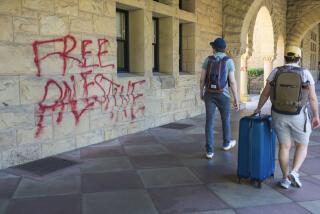Hate Crimes Against Muslims Condemned : Vandalism: A spectrum of ethnic leaders calls destruction at USC professor’s office an example of scapegoating and stereotyping of a religious group.
- Share via
As part of a growing multiracial movement to combat hate crimes, a coalition of community leaders Wednesday denounced vandals who destroyed computers and scrawled defamatory messages on the office walls of a Muslim professor.
Vandals broke into the USC office of Iraj Ershagi, a petroleum and chemical engineering professor of Iranian descent, poured motor oil and battery acid over office equipment and destroyed research papers. They also spray-painted graffiti on Ershagi’s office walls, including “No Scuds, Never Again,” “No More Hostages” and “Death to Hezbollah,” a pro-Iranian terrorist group.
The March 14 crime is symptomatic of the pervasive scapegoating in which Middle Eastern immigrants are “wrongly associated with Saddam Hussein, with Shiites, Hezbollah terrorists, with anti-Jewish attacks,” said Salam Marayati, director of the Muslim Public Affairs Council.
“Our particular problem is the stereotyping of Islam as the fundamental (international) problem that America faces today,” he said. “Communism is dead, therefore people are looking for a new enemy.”
Ershagi, 50, is an American citizen who has lived in the United States since 1966. He is active in the Muslim religious community and spoke at campus and community forums about the Middle East policies and oil production during the Persian Gulf War.
He said he was stunned when he entered his office after being notified of the vandalism by campus police.
“I really feel the person who did this is very ignorant,” Ershagi said. “As a professor I want people to challenge me intellectually. This is not the way to communicate.”
He said the slurs against him were analogous to calling “an American Catholic or Protestant . . . responsible for what happens in Ireland.”
Joining the Muslim organization at Wednesday’s meeting at USC were university officials and representatives of the Anti-Defamation League, the Japanese American Citizens League and Mayor Tom Bradley’s office.
“We trust that this coming together of diverse groups with indeed very different political agendas will show that the effect of hate crimes is the very opposite of what the perpetrators hope,” said David Lehrer, regional director of the Anti-Defamation League. “We will be bound closer together in defiance of what has occurred. We will not be divided in pursuing justice.”
Los Angeles police are investigating the incident, which caused $30,000 in property damage. No arrests have been made. USC Provost Cornelius J. Pings said it was the only hate crime against a professor in recent memory. He decried the incident as a “crude and cowardly act” that is particularly disturbing on a college campus.
Recent statistics showed a 22% increase in hate crimes in Los Angeles County in 1991, prompting many leaders of racial and ethnic groups to call for a unified stand against the most egregious cases. A Los Angeles County Human Relations Commission study indicated that such crimes are becoming more violent.
In December, a coalition of African-American and Asian-American organizations spoke out against the beating of a Thai woman by two men in Compton who shouted anti-Japanese epithets to police during their arrest.
“We want to make it clear that hate crimes are not isolated phenomena for one group,” said Ron Wakabayashi, executive director of the city’s Human Relations Commission. “Its occurrences are broad-based.”
Earlier Wednesday, representatives of 35 community groups met with Wakabayashi to form the Hate Violence Response Alliance, a coalition that will devise programs to help hate-crime victims, repair damaged property and homes and aid neighborhood watch groups fighting harassment.
More to Read
Sign up for Essential California
The most important California stories and recommendations in your inbox every morning.
You may occasionally receive promotional content from the Los Angeles Times.













